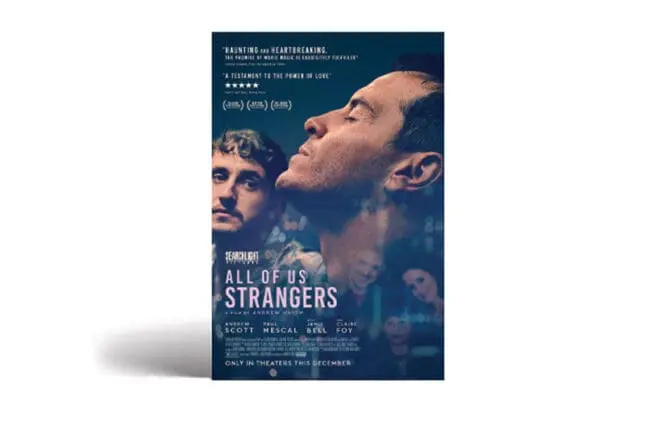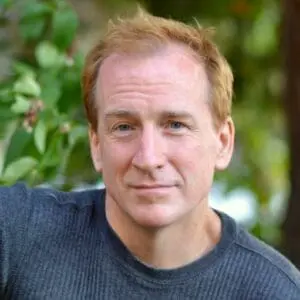The film All of Us Strangers opens with Adam (Andrew Scott), a sad-eyed, mid-40s queer writer in the early aughts, sequestered in his apartment to work on his next book, a memoir—but really he’s just staring at a blank laptop screen. When he stands by the floor-to-ceiling window, the London cityscape gleams in the distance with its promise of bustle and noise, yet his sense of apartness is stark, as if he’s in some hermetically sealed bubble of his own psychological construction. (No one achieves a pitch of tender, lost-boy vulnerability better than Irish actor Andrew Scott in this Golden Globe-nominated performance.)
A knock on the door. His neighbor, Harry (Paul Mescal), whom we’re led to believe is the only other occupant in this high-rise building, and whom Adam has only seen from a distance, leans on the frame. “Hello, I saw you looking at me from the street,” he says, holding a half-empty bottle of sake, then slurs, “How about I come in? If not for a drink, then for whatever else you might want.” Smiling, Adam blocks his entry, even though we viewers know he’s desperately lonely (and Paul Mescal is gorgeous). Then he sits on the couch and stares and pines.
What strange world are we in here, where we know we’re in a crowded city but barely see any other people? Where two gay men are the only occupants in a tall, sleek building with desirable views? Where out of nowhere an Irish heartthrob, brimming with longing, knocks on the door of his gay neighbor and, intuiting his loneliness, asks the question on both their minds: “How do you cope?”
And it gets stranger.
Adam wanders in the city, but there are no people. In a grocery store, he notices a mustachioed stranger (Jamie Bell, of Billy Elliot fame, all grown up), who’s somewhat reminiscent of Harry. The stranger brushes past and Adam follows him into a wooded area. There’s the intimation this might be some kind of hook-up. When the two men see eye to eye, they smile. The stranger invites Adam to follow him and, bizarrely, they return to the home where Adam grew up. The man is his father, the same age he was when he was killed in a car crash. Adam’s mother (Claire Foy), killed in the same wreck, opens the door. “Yes, it is you,” she says wide-eyed. “Don’t just stand there. Get yourself inside.” The parents—Are they ghosts? Hallucinations? Dream figures?—behave casually, as if settling in for an evening at home. How about a snack? They want to catch up on the last 30 years of his life. Confused, he doesn’t ask questions, enraptured with the chance to visit with them.
All of Us Strangers, now available on Hulu, is loosely adapted from Taichi Yamada’s 1987 novel, Strangers, which was translated from Japanese into English in 2003. Although the novel is billed as a “ghost story,” the film adaptation gives no such hints about genre and leaves us wondering what’s real and what’s imagined and if what’s imagined could actually be what’s true. The adaptation is the rare film that improves upon the book, deepening the story’s interiority and psychological heft.
As a psychotherapist watching the narrative unfold, Adam reminds me of every trauma survivor I’ve ever known: the shame, the inability to find the words to describe their experience, the looks of far-off dissociation, and the profound sense of stuckness and isolation. After the death of his parents, Adam went to live with his grandmother and wasn’t allowed to go to the funeral for fear it would compound his misery. He now has no friends, no family, no lovers, no community. He can’t move on with his life. His journey feels less like a ghost story—although what else can we call these apparitions?—and more like a dreamy allegory about healing from traumatic loss.
Definitions of trauma abound these days, but I’m partial to the simplicity of Resmaa Menakem’s in My Grandmother’s Hands: “Too much, too soon, too fast.” The lightning-quick onslaught of tragedy leaves no room for someone to make sense of what happens. Somatic responses go haywire, leaving painful effects that linger into adulthood. If we invert Menakem’s elegant formulation, to understand what the antidote for trauma might be, we come up with another simple catalogue: break down what happened into manageable bits; slow down the pace of sense-making and digestion; and grapple with the lifelong implications of “too soon.” There’s no therapist in All of Us Strangers to guide the way. There doesn’t need to be. The human figures, especially the ghosts, seem to find their way, and it’s moving and instructive for anyone thinking about how we live our lives after personal calamity.
Adam’s slow-burn romance with pensive Harry is intertwined with his conversations with the ghost parents, who are so curious about the life he’s made since they left him. Scenes of the men talking and dancing and having sex are interspersed with Adam’s furtive journeys back to his childhood home, where his parents wait for the next conversation. Even though it’s a strange situation, no one asks questions about ghosts or hallucinations or how long the time together will last. No one wants to pop the illusion.
“Death ends a life,” the psychologist Robert Jay Lifton tells us, “but it does not end a relationship.” Rather than rewind and replay scenes that have already happened, All of Us Strangers fast-forwards into new action, tackling conversations people wish they’d had. The ghost parents knew they had had a misfit son who didn’t fit in, couldn’t play sports, and suffered bullying at school. “You make me sound like a terrible cliché,” Adam laughs uncomfortably. “Well, can you throw a ball?” his dad asks. “No, not at all,” Adam answers quickly. When Adam comes out to them as a gay man in his 40s, they have the predictable uneasy reactions that parents in the late 1980s might have had. But their discomfort is soon overshadowed by an acute awareness of missed opportunities. Adam’s dad acknowledges he’d once heard his son crying in his bedroom after school but didn’t try to find out why. He admits that he himself might’ve been the kind of kid who bullied a “girlie boy.” “Yeah, I know,” replies Adam. “I think that’s why I never told you.” But his dad’s expression shifts. Grief, rooted in a place of urgent gratitude, propels him into a better version of himself. “I’m sorry I never came into your room when you were crying,” he says, tearfully. Adam starts to say it’s okay, it was so long ago, but the longing for comfort is too much, and he starts crying. “Can I give you a hug now?” his father asks.
Both ghost parents come around quickly to accepting Adam’s queerness. The ghosts realize, in a way that people often don’t, that time can’t be wasted on grudges or judgment. When later Adam impulsively tries to bring Harry home to meet them, he can’t find them. When his mom and dad reappear, to him alone, they acknowledge their time with him is short. They go out for one last meal together at Adam’s favorite childhood restaurant.
“It hasn’t been long enough,” Adam tells them. “It hasn’t been close to long enough.”
“It never could be, could it?” answers his mother.
All the petty interpersonal flaws and human prejudices that infect relationships line up alongside the reality of the grave and lose their power. Maybe the parents are hallucinations, or dreams, or apparitions, but their truth seems indisputable.
“Trauma is not what happens to us,” Peter Levine, developer of Somatic Experiencing, reminds us, “but what we hold inside in the absence of an empathetic witness.” Indeed, the discovery of his ghost parents leads Adam to a blooming of eroticism and creativity. He finds he can tell the story of his loss to Harry, who responds with empathy. Adam starts to write again.
All of Us Strangers reshapes how we think about traumatic loss, as conversations that were cut short or never happened, but that can be excavated, conjured. It underscores the important role of imagination in healing. How do we complete or bring to closure stories that are cut brutally short? After much therapy, drawing on all the science-based tools, I’ve often found myself advising clients to wait for a sign from the universe, something that can shift an unsatisfying narrative, if we’re alert to its arrival. Imagination has a critical—and underacknowledged—role in healing.
After the ghost parents fade, the film gets stranger, if you can believe it, but I won’t give any spoilers. I only suggest that you watch it with friends who can help you figure it out and decompress afterward. After seeing the film in a theater in Portland, Oregon, my friend and I wandered outside in a daze and bumped into another theater-goer. “Do you understand what happened?” we asked at the same time, and we all puzzled together on the sidewalk in the dark.
Wayne Scott
Wayne Scott, MA, LCSW is a psychotherapist and writer in Portland, Oregon. His memoir, “The Maps They Gave Us: One Marriage Reimagined,” about a couples’ adventures in marital therapy, is available at: https://www.waynescottwrites.com/.













